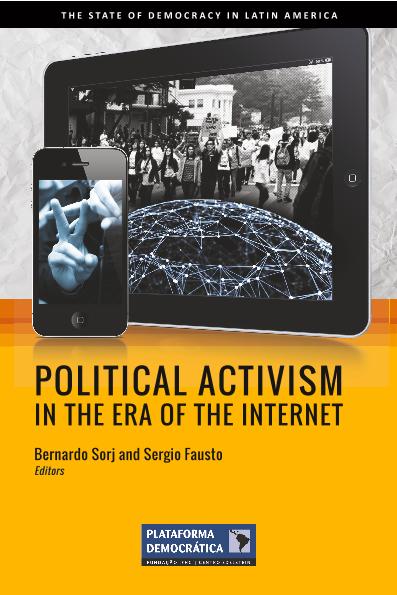Mostrar el registro sencillo del ítem
dc.contributor.author
Annunziata, Rocío

dc.contributor.author
Arpini, Emilia Nora

dc.contributor.author
Gold, Tomás

dc.contributor.author
Zeifer, Paula Bárbara

dc.contributor.other
Sorj, Bernardo
dc.contributor.other
Fausto, Sergio
dc.date.available
2020-08-27T17:31:25Z
dc.date.issued
2016
dc.identifier.citation
Annunziata, Rocío; Arpini, Emilia Nora; Gold, Tomás; Zeifer, Paula Bárbara; Argentina; Plataforma Democrática; 2016; 37-111
dc.identifier.isbn
978-85-92661-01-4
dc.identifier.uri
http://hdl.handle.net/11336/112572
dc.description.abstract
In this book we continue Plataforma Democrática's efforts to contributetowards the debate on the paths of democracy in Latin America and worldwide,focusing on the use made of the new means of communication by politicalactivists and how these in turn influence the ways in which politics is conducted.Contemporary democracies face enormous challenges: weakenedpolitical parties, global processes that redefine the national State spossibilities for action, social inequality and distrust of politicians. All theseareas and others not mentioned , are colored and influenced by thenew communication media.This book contains 19 case studies taken from six South Americancountries, presenting a broad range of innovative experiences and theirimpacts on the ways in which civil society, political parties and governmentsare organized and act. The cases of cyberactivism analyzed indicate that noneof them represents a silver bullet an experience capable of resolvingthe multiple challenges faced in constructing higher quality, more robustdemocratic institutions. But they all indicate new possibilities and newchallenges for the development of virtuous relations between the traditionalforms of participation (both in civil society organizations and in politicalparties) and activism in the virtual space.We are at the beginning of a new era, and there is much to learn,to monitor and to analyze. Without ignoring the fact that every attempt atsynthesis is partial and temporary, we hope that this book may contribute to the debate on a subject crucial for the future of democracy. Lastly, we wouldlike to acknowledge the important contribution made by the participants inthe workshops in which the preliminary versions of the texts on the diversecountries studied were presented.
dc.format
application/pdf
dc.language.iso
eng
dc.publisher
Plataforma Democrática
dc.rights
info:eu-repo/semantics/openAccess
dc.rights.uri
https://creativecommons.org/licenses/by-nc-sa/2.5/ar/
dc.subject
DIGITAL ACTIVISM
dc.subject
INTERNET
dc.subject
COLLECTIVA ACTION
dc.subject
LATIN AMERICA
dc.subject.classification
Sociología

dc.subject.classification
Sociología

dc.subject.classification
CIENCIAS SOCIALES

dc.title
Argentina
dc.type
info:eu-repo/semantics/publishedVersion
dc.type
info:eu-repo/semantics/bookPart
dc.type
info:ar-repo/semantics/parte de libro
dc.date.updated
2020-08-25T15:22:21Z
dc.journal.pagination
37-111
dc.journal.pais
Brasil

dc.journal.ciudad
Sao Paulo
dc.description.fil
Fil: Annunziata, Rocío. Consejo Nacional de Investigaciones Científicas y Técnicas; Argentina
dc.description.fil
Fil: Arpini, Emilia Nora. Universidad de Buenos Aires; Argentina. Consejo Nacional de Investigaciones Científicas y Técnicas; Argentina
dc.description.fil
Fil: Gold, Tomás. Consejo Nacional de Investigaciones Científicas y Técnicas; Argentina
dc.description.fil
Fil: Zeifer, Paula Bárbara. Universidad de Buenos Aires; Argentina
dc.relation.alternativeid
info:eu-repo/semantics/altIdentifier/url/http://www.plataformademocratica.org/Arquivos/Political_activism_in_the_era_of_the_Internet.pdf
dc.conicet.paginas
398
dc.source.titulo
Political Activism in the Era of the Internet
Archivos asociados
